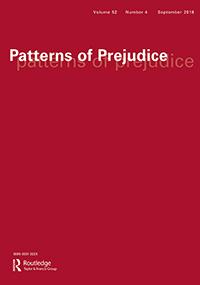

Patterns of Prejudice
ISSN: (Print) (Online) Journal homepage: https://www.tandfonline.com/loi/rpop20
One nation under God
Samuel L. Perry and Andrew L. Whitehead, Taking America Back for God: Christian Nationalism in the United States. New York and Oxford: Oxford University Press 2020. xvii+268pp. Appends. Notes. Bibl. Ind. £19.99 hbk. ISBN 978-0-190-05788-6.
Katie Gaddini
To cite this article: Katie Gaddini (2021): One nation under God, Patterns of Prejudice, DOI: 10.1080/0031322X.2021.1889150
To link to this article: https://doi.org/10.1080/0031322X.2021.1889150

Published online: 04 Mar 2021.

Submit your article to this journal


Article views: 29


View related articles

View Crossmark data

Full Terms & Conditions of access and use can be found at https://www.tandfonline.com/action/journalInformation?journalCode=rpop20

BookReview
OnenationunderGod
SamuelL.PerryandAndrewL.Whitehead, TakingAmericaBackforGod: ChristianNationalismintheUnitedStates.NewYorkandOxford:Oxford UniversityPress2020.xvii+268pp.Appends.Notes.Bibl.Ind.£19.99 hbk.ISBN978-0-190-05788-6.
InthefouryearsafterDonaldJ.Trumpwaselectedthe45thpresidentofthe UnitedStates,therewasanoutpouringofbooks,articles,think-piecesand talksthattriedtomakesenseofhisvictory.Manyofthesehavefocusedon singleissues,suchasclassorgeographiclocation,andhaveproducedtheoriesthatitwasthe ‘leftbehind’ whopropelledTrumpintopower.Many ofthosetheorieshavebeencriticized,andrightlyso,forcondensinga complexelectionintoonesingleissue.SociologistsSamuelPerryand AndrewWhiteheadcircumventthisanalytic flawintheirnewbook, Taking AmericaBackforGod,bypointingtoChristiannationalismasthepervasive ideologyunderpinningTrump’s2016electionandongoingpopularity.The titlerefersbacktoChristianSmith’s2000book, ChristianAmerica?WhatEvangelicalsReallyWant,inwhichSmithclaimedthatwhiteevangelicalswerenot tryingtotakeAmericabackforGodthroughpolitics,despitepopularbelief otherwise.BycarefullydistinguishingevangelicalsfromChristiannationalists,PerryandWhiteheadarguethat,whiletheformermayprioritizetheir religiousbeliefsoverpoliticalones,Christiannationalistsdotheopposite. ‘Inshort,Christiannationalismisallaboutpower ’,theywrite(86).And, bypower,theymeanpoliticalpower,whichtheydifferentiate,timeand again,fromthemoralinfluencethatwhiteevangelicalsseektoimposeon thecountry.Christiannationalismisanideologythatsupersedesrace, denominationalaffiliationandevenreligiousidentity. ‘ThisisChristian Nationalism:Christianityco-optedintheserviceofethno-nationalpower andseparation’ (143).
TomakethecasefortherelevanceandsignificanceofChristiannationalism,PerryandWhiteheadhaveundertakenacomprehensivemixedmethodstudythatdrawsondatafromthe2017BaylorReligionSurvey, qualitativeinterviewswith fiftyAmericansandparticipantobservationat variouschurcheventsinTexasandOklahoma.Fromthislargedatabase, they’vecreatedatypographyoffourcategoriesofAmericansthatrepresent differingdegreesofChristiannationalistviews:Rejectors,Resisters,
AccommodatorsandAmbassadors.Theopeningchapterexaminesthese fourtypesofAmericansindepth.PerryandWhiteheadarguethatthose mostsupportiveofChristiannationalism,theAmbassadors,havedeclined innumberinrecentyears.Theirpresenceandpower,however,remainas threateningasever.
Theethnographicvignettesfrom ‘FreedomSunday’ servicesonJuly4th (IndependenceDay)areparticularlyabsorbing.TheyemphasizePerryand Whitehead’spointthatthebeliefthatAmericais,orwas,aChristian nationremainsstrong.Chapter2openswithavignettefromthemegachurch FirstBaptistDallas,wherethepastor,RobertJeffress,deliversamessage entitled ‘AmericaIsaChristianNation’.Healsoreadsaloudaletterhe receivedfromthenVicePresidentMikePence,underscoringtheintertwined relationshipbetweenChristianity,AmericannationalismandTrump’s administration.
Thethirdchapter,entitled ‘Boundaries’,examinesthe ‘wallsthatexclude ethnic,racialandreligiousoutsiders’ (91).Christiannationalismfavours boundariesofallsorts:ideologicalonesthatdeterminewhocountsasa real American,andphysicalonessuchasTrump’sproposedborderwall withMexico.ThesectionexplaininghowChristiannationalistsremain unwillingtorecognizepolicebrutalityagainstunarmedblackAmericansis especiallypertinent,giventheongoingracializedviolenceinthecountry. Christiannationalistsseektopreserveracial,genderedandreligioushierarchies,accordingtotheauthors.Theword ‘back’ inthetitleofthebooksignals oneoftheprimarygoalsofChristiannationalists: back toanimaginedChristianhistory, back toacountrywithoutMexicanandMuslimimmigrantsand back toasocialorderthatprivilegeswhiteness,patriarchyandheterosexuality.But,whenitcomestoanalysingChristiannationalistprejudice towardsMuslims,PerryandWhiteheadcategorizeIslamophobiaasaboundaryagainstreligiousbeliefs,ratherthanemphasizingtheracisminherentin Islamophobia.Thefearof,ordiscriminationagainst,Muslimsisnotsimplya resultoftheAmbassadors’ proclivityto ‘favorChristianityoverotherreligions’ butservesasanotherexampleoftheirdeep-seatedinterestinmaintainingwhitesupremacy(106).
Duringtheheightofthe ‘culturewars’ inthe1990s,theReligiousRight mobilizedaroundspecificissues,suchasabortion,gayrightsandabstinence-onlysexeducation,togainpoliticaltraction.TheReligiousRight’s attachmenttotheseconcernshasoftenbeenunderstoodasthedesireof Christianstoenforcetheirreligiousand/ormoralbeliefsonsociety. However,byuntanglingevangelicalismfromChristiannationalism,Perry andWhiteheadarguethatadesirefor ‘the “traditionalorder ”,where familiesfollowthepatriarchal,nuclearnorm’ iswhatdrivesthesepolitical attachments,ratherthanreligiousbeliefs(142).Indeed,theauthorsmakea compellingcaseforseparatingevangelicalismfromChristiannationalist ideology,thusdisturbingthewidelyheldnotionthatwhiteevangelicals ledtoTrump’selection. ‘Christiannationalismisnotboundtoanyparticular
religiousgroup’,theywrite(153).Thisdisentanglementshowsthediversity withinChristianity,thatnotallChristiansareevangelicals,andnotallevangelicalssupportTrump.Italsorescueswhiteevangelicalsfromtheirdemonizationbymainstreamculture.Thisargument,however,wouldbemore persuasiveiftheethnographicdatawasnotallcollectedfromevangelical churches,andiftheinterviewdataspecifiedthereligious,ornon-religious, identitiesoftheparticipants.Instead,thesedetailsaremissingexceptin thoseinstanceswhereparticipantsaredescribedas ‘aBaptist’ ora ‘Sunday schoolteacher ’.Readersareleftwonderingaboutthereligiousaffiliation oftheintervieweesandthemeaningstheyattachtotheirfaith.According totheinterviewguideintheAppendix,alloftheAmbassadors,those stronglyidentifyingwithChristiannationalism,areChristians.Elsewhere, however,theauthorsclaim: ‘Morethan15percent[ofAmbassadors]are blackProtestants,Jewish,unaffiliated,orofanon-Christianfaith’ (58).
Nevertheless,nowthatthe2020electionhasremovedTrumpfromoffice, andthepoliticalterrainintheUnitedStatesremainsundoubtedlychanged byhispresidency, TakingAmericaBackforGod isanurgentread.Itmaynot fullyexplaintheriseofapopulist,right-wingleader,butitgoesalong wayinthatdirection,makingitaboldandincisivebookforthepresent andthefuture.
KatieGaddiniSocialResearchInstitute,UniversityCollegeLondon ©2021KatieGaddinik.gaddini@ucl.ac.uk https://doi.org/10.1080/0031322X.2021.1889150
